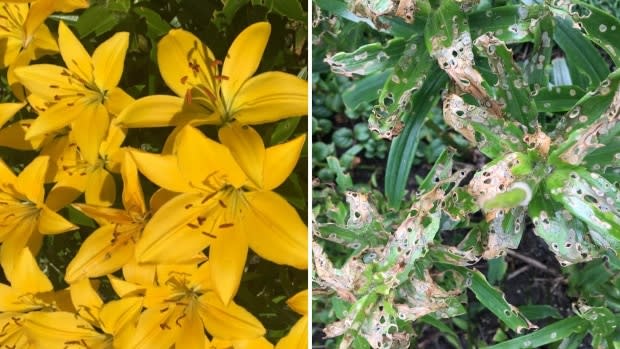Goodbye lily beetle? Olds College releases wasp predator as part of study
Good news gardeners: Ken Fry with Olds College wants to get rid of the lily beetle.
The non-native red beetle is a plague to those who grow lilies and fritillaria.
That's where Fry comes in. The entomologist and horticulture instructor is studying the effectiveness of a parasitic wasp that preys on the lily beetle.
Early results from releases in Calgary and Olds show that wasps are doing their job. Fewer lily beetles were spotted in the Olds release site, Fry told Edmonton AM on Wednesday.
"Ultimately we want to achieve the natural management of a natural predator ... And re-establish that natural balance," he said.
The parasitic wasp, Tetrastichus setifer, is native to Asia, as is the beetle.
The beetle's first arrival to Canada is thought to have been through the lily trade, getting a free ride on lilies or bulbs in the adult or egg state.
First spotted in Montreal in the 1940s, the beetle is now a resident of every province in Canada except British Columbia, according to the college.

So how will the wasp get rid of the beetle? It destroys its prey by laying its eggs in the larval stage of the lily beetle.
"It waits until that lily beetle finishes feeding and pupates, which means go through a metamorphosis stage," Fry said. "And at that point, it starts to consume the lily beetle."
"It eats it from the inside out, much like that movie Alien. It pops out as an adult come springtime. The beetle provides food, provides an overwintering site for it, and the wasp comes out in the spring looking for new beetles."
The wasp only hunts lily beetles so there's no risk of hurting any other native species, Fry said.
Testing in a lab ensured researchers that the wasp would only destroy the red lily beetle in the province.
"There's a very strict bio-control committee in Canada that looks at every potential introduction into the country and has to pass pretty severe screening," he said.
"We're not bringing something in willy nilly. A lot of considered thought [went in] to bring in a particular, natural enemy to manage a non-natural species."

